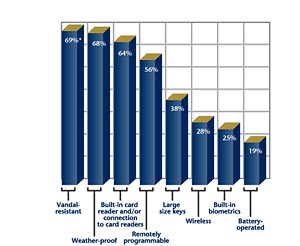When it comes to stand-alone systems such as keypads and electronic door locks, your customers want rugged reliability. Although the technologies and how they are used vary widely, end-user companies who employ these types of systems for the most part want to keep them simple and easy to use.
Keypads are clearly the workhorses of security. “Keep it simple,†said one respondent to an informal SDM online survey of Security Magazine’s end-user subscribers. “The more gizmos there are on the system means the more things that can and will go wrong.†Only one-fourth of respondents were interested in high-end features or built-in biometric technology.
Another respondent touted simplicity on another level. “Ease of use for your employees is paramount. If it is difficult to use, they will find ways to circumvent it.â€
At the Department of Veteran’s Affairs in West Palm Beach, Fla., keypads are used throughout the facility, but especially in the pharmacy, says Tracy Johnson, chief of processing and decontamination.
At the VA hospital, it is important to keep records. That is why the hospital’s keypads are linked to a hard drive. “Anyone who uses their code to enter a specific door, it will log in that information,†Johnson notes.

“We have keypads for several of our doors in the main building,†he says. “I run a prison, so the [magnetic] locks can’t be opened unless with a key. The keypads allow authorized people to go out.â€
Keith Dean, director of security, Great Eastern Resort, Harrisonburg, Va., uses keypads for safety in conjunction with magnetic locks. “We’re currently in the process of finishing a water park at the bottom of the mountain,†he says. “When it’s completed, it will be the largest indoor/outdoor water park in the eastern United States. We’re using electronic access for the egress systems at some of our outdoor pool areas.â€
Keypads are located on the outside of the pools so employees can enter that way, but the doors are locked to guests and alarmed on the inside.
“The reason we keep it locked is when the pool is not in use, we don’t have lifeguards,†he says. “But this system still allows it to be used as an exit in case of an emergency.â€

Stand-alone Electronic Door Locks
Stand-alone door locks differ from keypads in that they can use a multitude of technologies for opening the lock, from keypads or push buttons to proximity and smart cards. Although reliability and durability are considered important features, those interviewed were just as concerned about how a door lock operates as how durable it is.Doug Rose, CPP, is senior security analyst for Science Applications International Corp., McLean, Va. Rose’s firm consults for government and corporate clients.
“We use these systems in hospitals quite a bit, as well as in some computer room applications,†he reports. “They are very good for mechanical rooms (a room within a room).â€
For Rose’s clients, stand-alone access control systems are a good fit when they want them to be easy and secure. “Normally when I’m working with customers, this is where they want their quick, inexpensive fixes, but don’t necessarily just want a PIN system,†Rose notes. “They want a full audit trail.â€
Another advantage to these types of systems, Rose explains, is that they can be tied in with the overall security system. Often, employees can use their existing access control cards on the stand-alone system.
“With a lot of our companies, we can normally set something up for the stand-alones within their hardwired access control systems,†he notes. “They are very convenient. They are great for rooms with very little turnover. It’s part of a cost savings. Whenever you start looking at cost-benefit, it’s wiser to go stand-alone.â€

“Make sure that they can be integrated into an access system as the customer wants to expand their use,†said another.
“Confirm that any technology is consistent with other technologies in use at the facility,†said a third.
Andrew Robinson, CEO of Comm-Tech, Prescott Valley, Ariz., views stand-alone electronic locks as one of many security tools at his facility. The company does research and development for mining operations of a sensitive nature.
“We use them mainly in several mining operations that have security issues, and they are using them for access control,†he explains. “Our security plan is layered. One or two things aren’t going to do it. But if you put up six barriers, it might. This is just one of the layers of security.â€
Robinson also cites reliability as a top concern. “We are looking for reliability more than anything else,†he emphasizes. “Some of these projects are fairly valuable, so cost is not an issue.â€

Future Plans
More than one-third of respondents say their company reviews their current keypad and electronic door lock systems with regard to changing needs or new technology on an ongoing basis. However, about the same number do such reviews less frequently than once a year.Still, 45 percent have purchased new systems in the past 12 months (47 percent have not). A total of 41 percent plan to purchase systems in the coming year, compared with 25 percent who do not (32 percent are not sure).
For those who are considering purchasing a new system, 27 percent cited the need to improve security at their facility as the main reason. Twenty-three percent said problems with their current unit would cause them to select a new or different system, and 18 percent said new technology would entice them to make a switch. N
Rugged reliability and durability are what customers say they want from keypads and stand-alone electronic locks, according to SDM's research of your potential customers.

What They Expect from You: Knowledge and Support
Across the board, the level of dealer support and knowledge is paramount to end-users who purchase access control products.An overwhelming majority – 86 percent – cited technical support as the key criteria
in selecting a vendor or the security dealer. “Dealer support is very important,†said one respondent.
“Timely response to issues/questions/ concerns with one point of contact†was the suggestion of another.
Nearly as many respondents – 85 percent – cited knowledge and skills as an important factor in choosing a dealer. “Consider the long-term support and maintenance of the system, and the expertise of those who will be maintaining it,†said one.
Also high on the list were value and having a local office. “Always buy from a local dealer with knowledgeable field staff,†advised one respondent.

